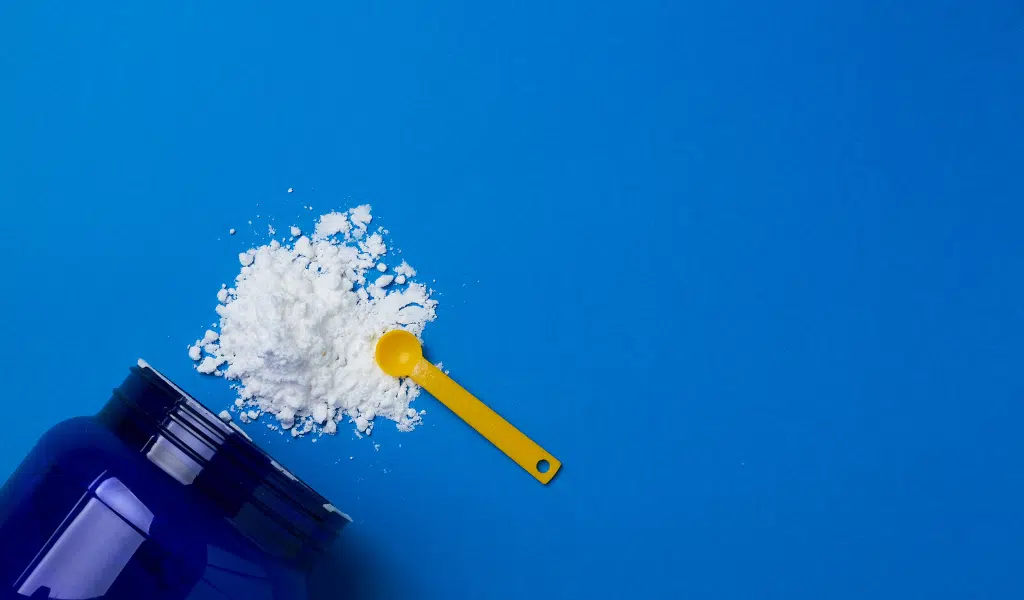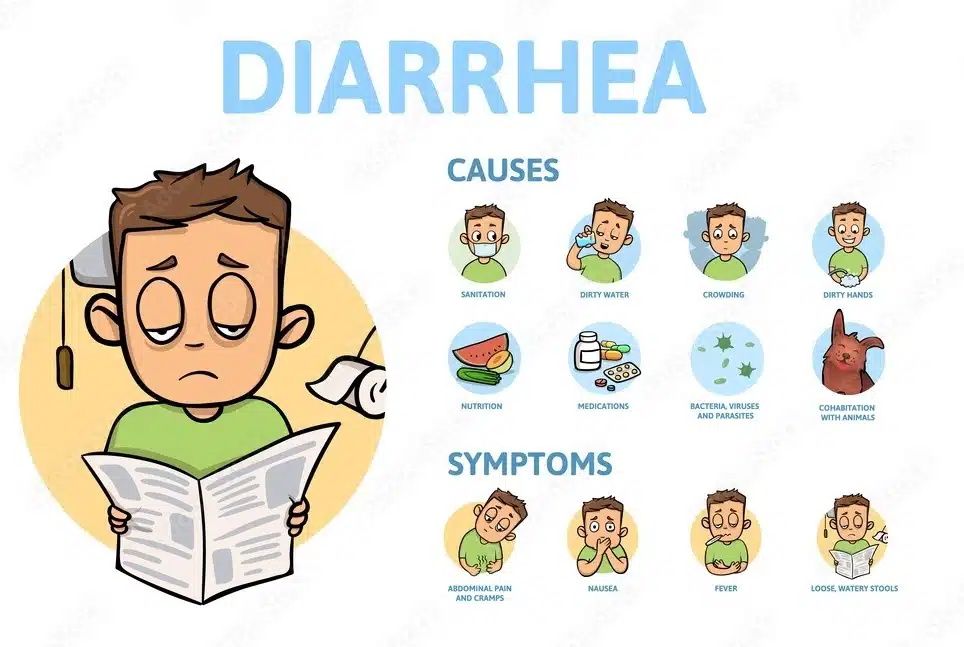Like any supplement, creatine is not without its side effects. Among the undesirable effects that some individuals may encounter is the possibility of experiencing diarrhea. So you want to know more about creatine diarrhea?
This concern has led many to wonder if the benefits of creatine are worth the risk of digestive discomfort. In this exploration, we will delve into the factors contributing to creatine-induced diarrhea, the importance of proper dosing, and strategies to mitigate this issue, ensuring you can make informed decisions about incorporating creatine into your fitness journey.
What is Creatine?
Creatine is an amino acid, that serves as a fundamental building block for proteins that play crucial roles in muscle and bone development, tissue repair, and various other bodily functions. This natural compound is a valuable energy source, particularly for your skeletal muscles during contractions, ensuring a continuous energy supply while you engage in physical activities, especially exercise.
Approximately half of the creatine your body requires (about 1 to 2 grams per day, equivalent to the size of 1 to 2 jellybeans) is obtained from your diet, primarily from protein-rich foods like red meat (pork, veal, and beef), seafood (fish and shellfish), and animal milk (e.g., cow, goat, and sheep milk).
The other half of creatine is synthesized within your body, primarily in your liver, kidneys, and pancreas. These internal sources deliver approximately 95% of the creatine produced to your skeletal muscles, which are utilized during physical activities. The remaining portion is distributed to other vital organs, such as the heart, brain, and other tissues, for various physiological functions.
How Does Creatine Work?
When you begin taking creatine, most of it is absorbed by your skeletal muscles, which combines with phosphoric acid to form phosphocreatine or creatine phosphate. Phosphocreatine is crucial in generating adenosine triphosphate (ATP), a vital energy source your cells use during exercise, especially during intense lifting or physical activities.
Apart from providing an enhanced energy supply and promoting muscle growth, creatine offers several other benefits, including:
- Accelerated Muscle Recovery: During exercise, your muscle fibers develop tiny tears. As you recover, these micro-tears heal and contribute to muscle strength. Creatine helps activate satellite cells within your muscles, aiding in the healing process of these micro-tears and fostering muscle recovery.
- Increased Anabolic Hormones: Creatine supplementation can increase anabolic hormones, which promote tissue repair and growth. These hormones include insulin, human growth hormone (hGH), estrogen, and testosterone.
- Enhanced Muscle Cell Hydration: Creatine helps boost water content within muscle cells, leading to better cell hydration. This may facilitate muscle growth and reduce the risk of dehydration and muscle cramps.
- Potential Brain Benefits: Creatine can also elevate phosphocreatine levels in the brain, which has been suggested to affect memory positively.
By incorporating creatine into your routine, you can experience improved exercise performance, muscle growth, and faster recovery while also enjoying potential cognitive benefits.
Using creatine as directed and with a well-balanced diet and appropriate exercise regimen is essential for optimal results. As with any supplement, it’s recommended to consult with a healthcare professional before starting creatine supplementation, especially if you have any underlying health conditions.
Related Read: Creatine vs. Pre Workout
What is Diarrhea?
Diarrhea is a condition characterized by loose and watery stools, often accompanied by an increased frequency of bowel movements. It is a widespread issue that typically lasts 1 or 2 days and resolves without medical intervention.
When diarrhea persists for more than 2 days, it may indicate a more severe underlying problem. There are two main types of diarrhea:
- Short-term (acute) diarrhea: Lasting for 1 or 2 days, acute diarrhea is commonly triggered by consuming contaminated food or water, leading to bacterial infections or viral illnesses.
- Long-term (chronic) diarrhea: This type continues for several weeks and can be linked to various health conditions, such as irritable bowel syndrome, inflammatory bowel diseases like Crohn’s or celiac disease, and infections caused by parasites.
Can Creatine Cause Diarrhea?
Yes, creatine supplementation can cause diarrhea as a potential side effect, but it appears to be dose-dependent. The impact of creatine on digestive health varies based on the amount consumed.
In a study involving athletes, those supplemented with a high dose of 10 grams of creatine in a single serving experienced adverse gastrointestinal effects, including diarrhea, stomach upset, and belching. On the other hand, individuals who took a lower dose of creatine, ranging from 2 to 5 grams in a single dose, did not report the same digestive issues.
The reason behind creatine-induced diarrhea lies in its ability to draw water into muscle tissues. When not properly digested or absorbed, excess creatine can remain in the intestines, pulling water from other body parts and leading to an influx of water in the intestines. This disturbance in the normal digestive process can result in loose stools and diarrhea.
To minimize the risk of diarrhea and other digestive discomfort while using creatine supplements, it is advisable to adhere to recommended dosages and consult with a healthcare professional or a sports nutritionist to determine the appropriate amount for individual needs and goals. Additionally, staying well-hydrated and taking creatine with a balanced meal can also help reduce the likelihood of experiencing gastrointestinal side effects.
Creatine Monohydrate and Diarrhea
Creatine monohydrate is not limited to supplements; it naturally occurs in the human body. It is formed by combining amino acids from the liver, kidney, and pancreas, eventually converting into creatine phosphate. Creatine phosphate plays a vital role in adenosine triphosphate (ATP) production, which provides energy for muscle contractions, thus contributing to muscle strength.
Improperly digested creatine may remain in the intestines, where it attracts water from other body parts, including muscle tissues. This action continues as creatine draws water to itself. The increased influx of water into the intestines can disrupt the normal digestion process, potentially leading to diarrhea.
You May Find Interest: Does Creatine Make You Bloated
How to Prevent Diarrhea When Using Creatine Monohydrate?
To avoid the risk of diarrhea while using creatine monohydrate, following the recommended guidelines and taking certain precautions is essential. Here are some important points to consider:
- Stick to Recommended Dosage: Experts advise consuming 3-5 grams of creatine monohydrate daily. Taking more than this recommended dose will not lead to additional muscle size or strength benefits and may result in issues like diarrhea.
- Spread Out the Doses: Rather than consuming a large amount of creatine all at once, it’s better to divide the daily dosage into smaller portions and take them throughout the day. This approach helps the body absorb and utilize creatine more efficiently.
- Stay Hydrated: Creatine tends to draw water into muscle tissues, so drinking plenty of fluids while taking the supplement is crucial. Proper hydration can help counteract the risk of dehydration caused by the influx of water into the intestines and reduce the chances of experiencing diarrhea.
- Take Creatine with Meals: If diarrhea persists, take creatine monohydrate with meals instead of on an empty stomach. This may help alleviate digestive issues and improve the supplement’s absorption.
- Assess Health Status: Ensure you are healthy and have no kidney problems before starting creatine supplementation. If you have any concerns about your health, consult a healthcare professional before using the supplement.
- Age Restrictions: Creatine monohydrate should not be used by individuals under the age of 18.
Other Side Effects of Creatine
Creatine is a widely studied and highly effective supplement that enhances muscular endurance, strength, and power. Despite its benefits, some potential side effects are associated with creatine usage. However, these can be effectively managed with simple strategies.
- Cramping: Cramping is a reported side effect of creatine but is typically linked to insufficient water intake. To avoid cramping, it is essential to stay well-hydrated by drinking an adequate amount of water throughout the day.
- Water Retention: Creatine is osmotic, drawing water into the muscle cells. As a result, some individuals may experience water retention, leading to a temporary weight gain of around 5-7 pounds when starting creatine supplementation. To minimize water retention, it is recommended to use a lower daily dose of creatine, such as 2.5 to 3 grams, which can still provide benefits without excessive water-related effects.
- Gastrointestinal Discomfort: Some individuals may experience mild gastrointestinal discomfort when using creatine, such as bloating or gas. To manage this, consider taking creatine with meals. Consuming the supplement alongside food can aid in absorption and reduce the likelihood of digestive issues.
- Weight Gain: As creatine draws water into the muscles, it can lead to an increase in body weight. While this is often temporary and related to water retention, some individuals may be concerned about weight gain. If weight management is a priority, monitoring overall caloric intake and maintaining a balanced diet is essential to ensure any potential weight gain is within the desired range.
- Kidney Strain (for those with pre-existing kidney conditions): For individuals with pre-existing kidney problems, using creatine may place additional strain on the kidneys. It is crucial to consult with a healthcare professional before starting creatine supplementation if you have any kidney concerns. In such cases, avoiding using creatine or considering alternative supplementation options may be advisable.
Should I Take Creatine Every Day?
Whether or not you should take creatine every day depends on individual factors, as each person’s body is unique. To ensure safe and suitable usage of creatine, it is crucial to consult with a healthcare provider before starting supplementation. They will be able to assess your specific health status and provide personalized recommendations.
Taking creatine daily and the appropriate dosage should be determined based on several considerations, including:
- Personal Health: Your healthcare provider will review your medical history, current health conditions, and any medications you may be taking. This evaluation helps to identify potential contraindications or interactions that may impact the safe use of creatine.
- Fitness Goals: Understanding your fitness objectives is essential. Whether you aim to enhance muscle strength, improve athletic performance, or aid in muscle recovery, your specific fitness goals will influence the appropriate creatine dosage and frequency.
- Physical Activity: The intensity and frequency of your activities also play a role. If you engage in high-intensity workouts or endurance training, you may require a different creatine regimen than those with a less intense exercise routine.
- Body Weight: Your body weight can impact the ideal creatine dosage, as larger individuals may require slightly higher amounts than smaller individuals.
- Creatine Source: Various forms of creatine are available, such as creatine monohydrate or creatine hydrochloride. Your healthcare provider can guide you in selecting the most appropriate form based on your needs.
A healthcare provider can offer personalized recommendations to ensure that creatine supplementation aligns with your health goals and overall well-being.
Other Causes of Diarrhea
There are other reasons you can get attacked by diarrhea. Some common causes of diarrhea include:
- Infections: Bacterial, viral, or parasitic infections can lead to diarrhea. Contaminated food, water, or contact with infected individuals can transmit these pathogens.
- Food Poisoning: Consuming food contaminated with harmful bacteria or toxins can trigger acute diarrhea.
- Food Intolerance: Some people may have difficulty digesting certain foods, such as lactose (found in dairy products) or fructose (found in fruits), leading to diarrhea.
- Medication Side Effects: Certain medications, especially antibiotics and some laxatives, can disrupt the balance of gut bacteria and cause diarrhea.
- Inflammatory Bowel Disease (IBD): Conditions like Crohn’s disease and ulcerative colitis are chronic inflammatory disorders that can result in diarrhea.
- Irritable Bowel Syndrome (IBS): A functional bowel disorder characterized by abdominal pain, bloating, and changes in bowel habits, including diarrhea.
- Celiac Disease: An autoimmune disorder triggered by gluten consumption, which damages the small intestine and leads to diarrhea, among other symptoms.
- Malabsorption: Conditions that impair the absorption of nutrients in the intestines, such as pancreatic insufficiency or bile acid malabsorption, can cause diarrhea.
- Traveler’s Diarrhea: Occurs when individuals consume contaminated food or water while traveling to regions with poor sanitation.
- Stress and Anxiety: Emotional stress can influence gut function and contribute to diarrhea in some individuals.
Frequently Asked Questions (FAQs)
Below we’ll be showing some common FAQs related to creatine diarrhea. So, let’s check them out.
What are the common reasons for experiencing diarrhea while taking creatine?
The common reasons for experiencing diarrhea while taking creatine include taking too much creatine at once or during the loading phase, inadequate hydration, and individual variations in how the body reacts to the supplement.
How can I prevent or manage diarrhea while using creatine?
To prevent or manage diarrhea while using creatine, it is advisable to stick to the recommended dosage of 3-5 grams per day, spread out the doses throughout the day, stay well-hydrated by drinking plenty of fluids, and consider taking creatine with meals.
Is diarrhea a common side effect of creatine, or does it affect everyone who takes it?
Diarrhea is not experienced by everyone who takes creatine, as individual responses to the supplement can vary. Some people may be more sensitive to the effects of creatine and may be more prone to gastrointestinal side effects.
What are the dosing recommendations to prevent creatine-induced diarrhea?
Yes, to reduce the risk of creatine-induced diarrhea, it is recommended to follow the appropriate dosing guidelines, such as taking 2.5-3 grams of creatine daily, drinking enough water, and avoiding excessive intake during the loading phase. By doing so, individuals can still benefit from creatine supplementation while minimizing the likelihood of experiencing diarrhea.
Final Words
While creatine-induced diarrhea is a potential side effect that some users may encounter, understanding the key factors contributing to this issue can pave the way for responsible and safe supplementation. By adhering to recommended dosing guidelines, staying well-hydrated, and being mindful of individual tolerance levels, one can optimize the benefits of creatine while minimizing the risk of experiencing gastrointestinal discomfort.
As with any supplement, consulting with a healthcare provider or a sports nutritionist before starting creatine supplementation is essential, allowing for personalized recommendations and ensuring that your fitness goals align harmoniously with your overall well-being.
Disclaimer: This content is for informational purposes only and does not replace professional medical advice, diagnosis, or treatment. This information is not comprehensive and should not be used to make health or well-being decisions. Consult a qualified healthcare professional with questions about a medical condition, treatment options, or health regimen. This website or the content should never replace professional medical advice.









































